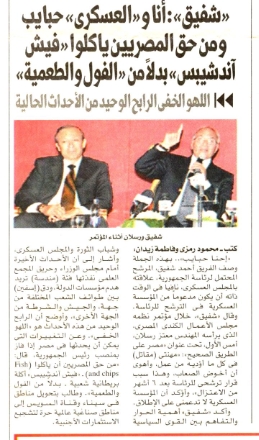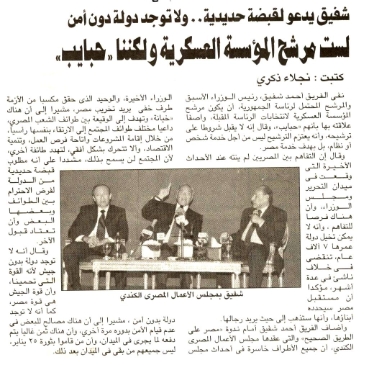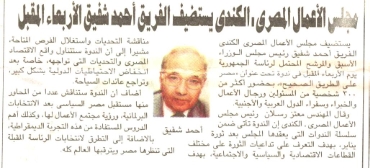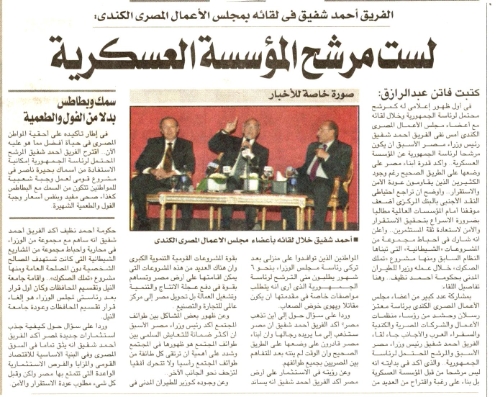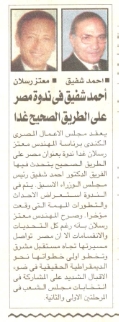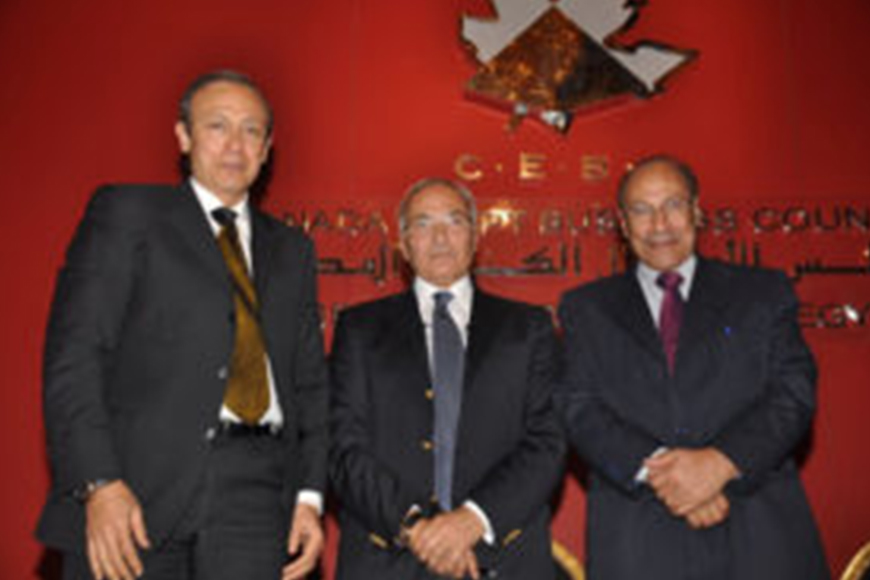
Date
Speaker(s)
Designation
Description
The Canada Egypt Business Council (CEBC) hosted a special meeting and panel discussion featuring former Prime Minister, as well as one of the most prominent potential presidential candidates, Engineer Ahmed Shafik, who was also the former Commander of the Air Force, and prominent journalist and thinker, Saad Hagras, the Managing Editor of Al Alam Al Youm newspaper. The event aimed at discussing where Egypt is heading and the challenges ahead.
The event is the seventh in a series of events addressing economic and political issues pertaining to Egypt after the revolution. The clashes between revolutionaries and the military, the security vacuum, the deteriorating economic situation as well as Shafik’s candidacy and what he promises if he succeeds in his quest to become Egypt’s president were some of the topics discussed during the event.
Over 270 prominent attendees attended the event from ministers, ambassadors, CEBC members and guests.
CEBC Chairman, Mr. Motaz Raslan, in his remarks, he highlighted the uniqueness of this event for being concurrent with the historic first parliamentary elections after the January 25 revolution, which will hopefully lead the country to democracy, he said. Raslan noted that in the past few months after the revolution, a question in the minds of all has been whether Egypt is on its right way towards achieving democracy and prosperity. He added, “The civilized manner in which the parliamentary elections took place is a token that the answer to that question is affirmative”. He also mentioned that these elections have seen the emergence of certain political groups, which were not active before the revolution; namely religious groups, who were able to attain the majority of seats. He also stated his belief that the voice of the majority of voters should be respected, even if one has reservations on the choices. He continued to express his hopes that the recent violent acts that have taken place downtown near the cabinet head office do not steal the joy of this immense step taken by Egypt towards democracy. Quoting Winston Churchill, Raslan said, “Egyptians are like sands, one maybe able to tread over, but when the wind blows, no one can stand in its face”.
Thinker and prominent journalist Saad Hagras and the moderator of the discussion assumed the floor. He shed light on Ahmed Shafik being the single military potential candidate,Nmentioning that Egypt has been ruled by the military since 1952 and under Mubarak, it was a deformed form of state due to the marriage between politics and money. He continued to say that Egypt is now at crossroads and there are several possible paths: either it emerges a modern civil state for the first time in its history, or becomes a religious state, a military state, or awaits a “turban-wearing general”.
Ahmed Shafik gave an opening statement, before answering the questions raised by the audience, in which he spoke of his stands on various issues, his career and past experience with the ousted regime as well as his tenure as prime minister right before the stepping down of Mubarak. On his military background, Shafik said, “my career is a fighter, not merely a fighter pilot, but a fighter by nature”. He asserted that during 40 years of serving in the air force and 11 years of serving as air marshal and then minister of civil aviation, he had a perfect record and a celebrated performance in every position he assumed. He continued to say that the reason why he is running for presidency is that he is Egyptian to the bones and that his genuine concern is Egypt, its safety and prosperity that is driving him to seek this position, he believes that he has a suggestions on how to better the Egyptian situation and thus he is presenting himself as a candidate for Egypt’s presidency.
In response to why he was chosen by Mubarak to serve as prime minster, Shafik said that there were local and international speculations that Shafik is a rising candidate for such a position before he was chosen by Mubarak. He also said that before the transformations that the revolution brought forth, he would have never been given that chance. He also stated that as the country was going through this turmoil, he could not turn the position down, even though it was clear that there would be little room for change and much turbulence surrounding the position.
Shafik delved further into the corruption that was prevalent in the past regime, and how even as a member of the cabinet he was helpless before it. He then explained that once assigned the position of prime minister, he pursued measures against two of the most outrageous corrupt government projects in his view; namely, the governorates movement and the Nile University.
On the economy level, Shafik said that he believes Egypt is a great land of opportunities waiting to be harvested. He then went further into details on several areas in Egypt where resources are plentiful and investing them is either deliberately suspended, as in the case of Lake Nasser, or neglected as in the case of the free zone in Port Said. He also spoke passionately of the extraordinary successes that he was able to achieve in Egypt Air and how using the same integrity and professionalism in management the same can be applied on the national scale.
The marshal also criticized the way the past regime has been handling the Nubian situation and added that the regime’s neglect incited calls for independence and separation among Nubians. He sees that this is one of the issues, which would be subject to immediate change, if he succeeds in his candidacy. Another issue is traffic, to which he proposed stipulating more deterrent punishments and applying the law without favoritism.
Shafik noted that his tenure as a prime minister was only one month; a very short period of time which is no indication of his performance. He also revealed that his views and stands on matters were met with opposition. Shafik expressed his deep regret on the lost opportunities that the revolution had reaped in its early months where he sees that the international community was willing to invest heavily in a new Egypt that has just gone through a glorious revolution, until the economy deteriorated dramatically. Finally Shafik clarified that he is not the armed forces’ candidate to presidency.
Dr. Hala Mostafa, the editor-in-chief of Al Democratia newspaper and former senior member of the dismantled National Democratic Party, who was known for her strong opposition to some of the old regime’s corrupt practices, noted to Shafik that because he is considered part of the former regime, a statement should be somehow made by the marshal to condemning the regime’s practices, especially regarding longstanding problems such as discrimination against Copts; and asking for his opinion on this specific matter. Shafik answered saying that he does not accept that his candidacy would be conditioned by a statement he has to make for a reason or another, as for the Coptic issue, he said that it is no longer the single minority, where turbulence occurs, and this is the focal point of strife. It is now one among many, he added, mentioning the Bedouins as one other significant minority. He then said that there is no solution but for the government to implement the rule of law upon those various groups and to enforce respect between them with an iron fist.
A question was posted by the audience about how Shafik will deal with an Islamic parliamentary majority. In response to that, Shafik said that it is best for these political groups to be integrated rather than suppressed. Other attendees asked the marshal on how he explains the past violent events in front of the cabinet’s head office and specifically the lenience in putting out the historic scientific complex’s building fire. The marshal answered saying that these actions are being funded by external elements and that failure to put out the fire was a result of mishandling the crisis due to the severe circumstances the whole situation was in. In response to a question on the type of government that best suits Egypt, he said that a presidential democracy is evidently the right path, since the party system in the country remains immature.
Shafik concluded the discussion elaborating that the revolution was the fruit of the work of various elements: “The youth started it, the Muslim Brotherhood backed it up and the armed forces gave it its blessing giving it success”.


